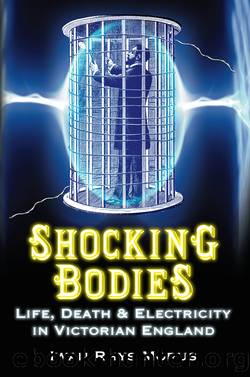Shocking Bodies by Iwan Rhys Morus

Author:Iwan Rhys Morus
Language: eng
Format: epub
ISBN: 9780752463810
Publisher: The History Press
Published: 2011-09-01T00:00:00+00:00
PART III
CONSTANCE PHIPPS
TEN
LADY CONSTANCEâS PAIN
Constance Phipps was ill and confined to her bed. She was suffering from headaches and probably complained of sensations of numbness in her arms and legs. The correspondence between her father and one of her medical practitioners, discussing the details of her treatment, does not specify exactly what was wrong with her, but from it we can learn several other things. The letters are undated but other evidence indicates that they were almost certainly written sometime between 1863 and 1871. Constance at this time would have been a young woman, somewhere between the ages of 11 and 19 â what we would call a teenager, though the Victorians had no such term in their vocabulary. It is further clear from the correspondence that a portion of Constanceâs treatment was being administered by her father, overseen by at least two other medical practitioners. One of these practitioners was Harry Lobb, who by the beginning of the 1860s was starting to forge a formidable reputation as an advocate of medical electricity. He specialised in the electrical treatment of neuralgia and nervous complaints more generally. Constance Phipps was at just the right age and was a member of the appropriate social class and gender to be regarded as particularly at risk of precisely these kinds of ailments.
The position in which Constance found herself was therefore not particularly unusual. By the middle of the nineteenth century, electricity was broadly accepted as an effective form of medical treatment for a wide range of nervous disorders by many medical practitioners, although its use as a therapy was also considered to be tantamount to outright quackery by many others. Self-proclaimed specialists in nervous diseases, such as Harry Lobb or Thomas Laycock, argued that young adolescent women like Constance were particularly prone to these kinds of conditions as a result of their sex and upbringing; they were at the mercy of their reproductive organs. Young women of the middle and upper classes, cosseted and spoilt by overindulgent parents and subjected to the whims of fashionable society, were almost inevitably given to hysteria â or so argued those men whose interests lay in promising ways of restoring equilibrium. Electrical treatments were offered to anxious paterfamilias as a way of bringing wayward family members back under paternal control.1 It is not clear how common it was for the anxious fathers to carry out the electrical treatment with his own hands, as seems to have happened in Constanceâs case, but advocates of electrotherapy quite often emphasised that this was a regimen that could be administered safely by a family member or servant under the appropriate medical direction. In many respects then, it seems reasonable to say that the cast of characters in this particular little drama were, if not typical, then at least not greatly out of the ordinary.
Paradoxically, the member of this cast about whom least is known is the leading lady. Very little can be gleaned about the short life of Lady Constance Mary Phipps.
Download
This site does not store any files on its server. We only index and link to content provided by other sites. Please contact the content providers to delete copyright contents if any and email us, we'll remove relevant links or contents immediately.
De Catalaanse brief by Robert Goddard(369)
A Piece of Cake by Sarah Swatridge(275)
Churchill's Spearhead by John Greenacre(260)
Nonlinear Dynamics and Chaos with Student Solutions Manual by Steven H. Strogatz(235)
The Ruin of J. Robert Oppenheimer by Priscilla J. McMillan(207)
thing bounces back europe by Unknown(187)
Popular Culture and Political Identity in the Arab Gulf States by Alanoud Alsharekh Robert Springborg(182)
Flowering of the Cumberland by Harriette Simpson Arnow(182)
Allied Bombing Raids by Philip Kaplan(178)
Guild and State by Antony Black(171)
A Japanese View of Nature by Kinji Imanishi Pamela J. Asquith(170)
Comet Madness by Richard J. Goodrich(169)
History Without A Subject by David Ashley(163)
RAF at the Crossroads by Greg Baughen(156)
Shocking Bodies by Iwan Rhys Morus(148)
The Seventies Now: Culture As Surveillance by Stephen Paul Miller(147)
A History of Greek and Roman Philosophy by John Hackney(145)
Air Battle for Burma by Evans Bryn;(145)
A History of Science in Society by Ede Andrew;Cormack Lesley B.;(137)
